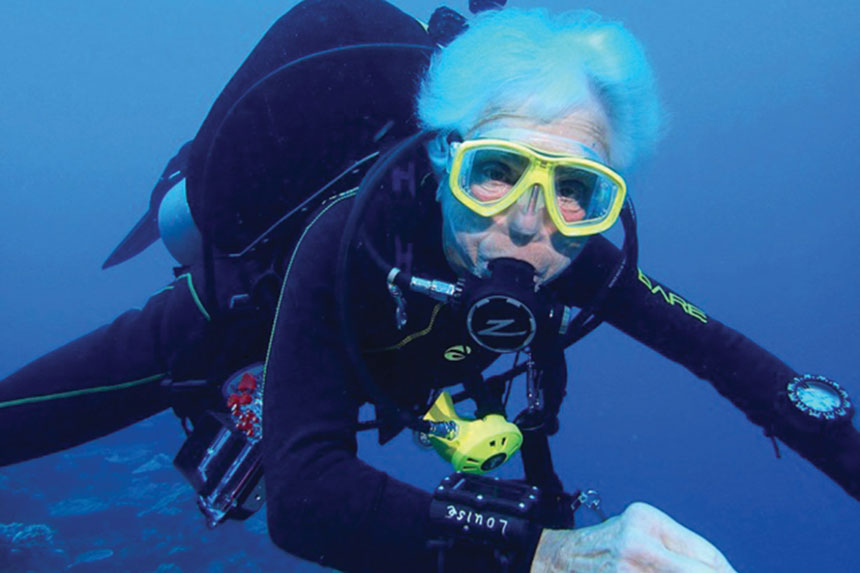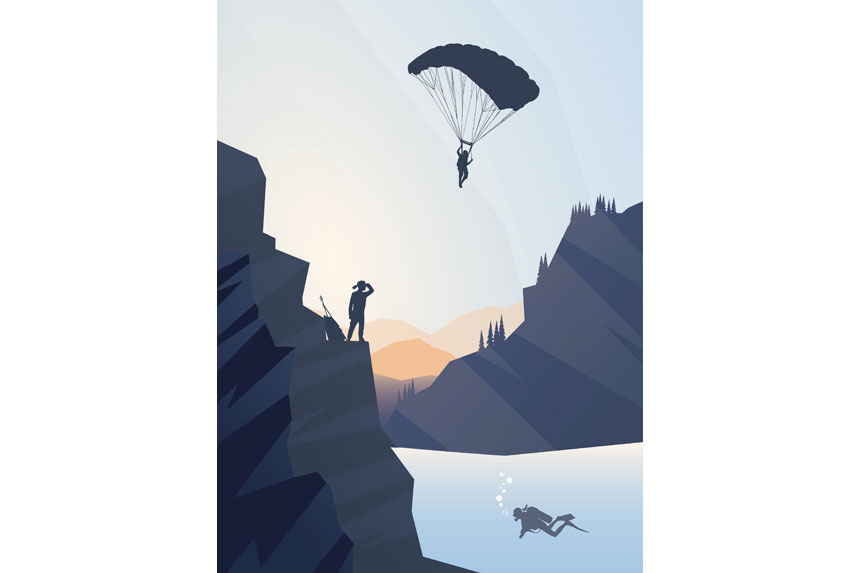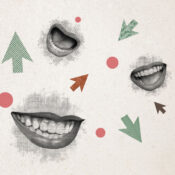Louise Wholey doesn’t seem to have heard the news that aging is difficult, diminishing, and a total bore. At age 80, she can still hoist her scuba tank onto her back from a sitting position if she maneuvers it right. Right now, she stands, then penguins around to peer out toward the ocean, and I follow her gaze, clutching my new fins and mask. I have just recertified in scuba diving after a long absence from the water (20 years); compared to Louise, who has 600 dives under her belt, I am a mere baby bird, scooting to the edge of the nest.
“You’re the expert,” I tell her when she suggests that our dive follow the jetty wall, taking in the fish that hide in the rocks and the kelp that sways along its edge.
“Oh, I’m no expert,” she responds. “There is always something new to learn.”
This is why I’m here today: I want to figure out the secret behind Louise’s expansive attitude, and how it links to the gumption that keeps her diving long after most people decades younger have hung up their masks and tanks. In other words, is outdoor adventure at a later age not just the result of a positive attitude toward getting older but actually the integral gateway to achieving that positive attitude?
I have white hair, range about 5′ 7″, Caucasian. This is how Louise described herself in a text so I would recognize her when I pulled my car into our Monterey, California, meeting place — though if she had written the Person Older Than Everyone Else, it would have been just as helpful. There are many divers milling around this pretty little beach park today, but they are almost exclusively under 40. Still, it’s impossible to me that Louise is actually 80 years old. Despite her wrinkled skin, etched in the manner of someone who has been outdoors her whole life, she moves with the short steps and bowed legs of a soccer player. When she stands, the curve of her upper back that sometimes comes with aging reminds me of a slouchy teenager at the mall. I wonder: When she dons her heavy scuba equipment and people suddenly realize how old she is, what do they say? “The typical reaction is ‘NO. You’re not 80,’” she says. “Or” — and here she feigns horror — “‘You’re 80?’”
I laugh and nod and think, Sounds about right. Then I ask if she is proud of that mixture of surprise and admiration so evident on their faces. “I would be,” I tell her. I mean, she’s representing all older women in that instance, and overturning prejudgments about what we can and cannot do. “That’s a thrill, right?”
She thinks about this for a moment. “I don’t have an attitude about age. It’s just something you carry with you. You can’t escape it.” She shrugs. “I don’t think much about it, I guess.”
In the past few decades, science has come to this stunning revelation: How we look at our own aging predicts how well we age. This means that if we think of our aging as a time of frailty, illness, and diminution, we are prone to cardiac events, earlier, and cognitive decline, earlier. Conversely, an optimistic outlook means one is healthier, happier, and lives a whopping seven and a half years longer.

Louise’s curious indifference to getting older is not exactly the same as a positive view on aging, but it still makes her the embodiment of what can happen when you are free of negative stereotypes and diminished expectations. Certainly there is something uniquely defiant about scuba diving in these particular waters at 80 years old. This part of the Pacific Ocean is always frigid (on this summer day, it is 50 degrees). The visibility can drop to almost nothing. When the wind picks up, there is a swell on entry from the beach that can knock you down. Oh, did I mention the shark attack? A swimmer was bitten by a great white two days ago, shutting down some of the coastline. Louise texted me about it, lamenting the potential beach closure but not the lurking shark. I think the text was also a courtesy — she was unperturbed, but perhaps I might not want to dive? (I did.)
Fully clad in our gear, we make our way along the grass that overlooks the ocean, and as we lumber to the water’s edge, Louise mentions that sharks, even the ferocious whites, are unlikely to attack divers — they usually hit victims on the surface, mistaking them for a hapless seal. I’m not concerned, and I tell her so as we wade through the break. I know the odds of being bitten are minuscule, and anyway there are at least 50 divers who will soon be out today, from whom the shark can choose. We float, affix our masks to our heads, and then Louise gives the thumbs-down — not a commentary on my diving skills so far, just the signal to descend. From now on we will be using hand gestures to speak: to communicate that one is fine, the okay sign is flashed; a thumbs-up is a signal to ascend (if you, like me, tend to try to tell your diving companion that you are okay by jauntily flipping the thumbs-up underwater, well, things get a little confusing); and so on.
Louise was clear from the start that my basic certification was just a “license that now lets you learn how to dive.” Even something as simple seeming as keeping oneself off the seafloor takes hours of instruction and practice. Certainly, descending with slow grace, while clearing ears to adjust for pressure and chomping tightly on the mouthpiece as one’s brain slowly grasps the strange reality of breathing underwater, is not easy. True to form, I make my way to the bottom looking like that drowned body during the opening credits of a Netflix thriller — lit by a ray of light from above, arms out, feet splayed, tumbling slowly. I hit the sand butt first instead of what Louise does, which is hover, fins down, then turn slowly horizontal and begin a swim just inches from the seafloor, never once touching it.
Diving with a landlubber is a departure from Louise’s usual routine. Much of her time under the ocean is spent in the service of citizen science, often for a conservation nonprofit called Reef Check: counting fish, measuring kelp, surveying the rocky outcrops. (Her husband, Jim, no longer gets into cold water, but she often partners up with her daughter, who is also an experienced diver and volunteer.) Scuba diving for science is not just taxing; it can be tedious, with its requisite repetition and attention to minutiae. But Louise assures me that for her, “it’s always interesting and challenging.”
When Louise assesses kelp health, now under siege from the rapidly warming oceans, her task is to count the stipes that grow from each main stem, or hold-fast, as it is called. They can number up to 100, and even more than that in a healthy plant. It’s often difficult to keep up the count, because the kelp is “swaying back and forth in the current and you’re swaying back and forth,” she explains; I imagine it’s like someone pushing on your pencil as you attempt to add up a very long grocery receipt.
While Reef Check mandates an annual refresher of new species and new survey techniques, it’s up to the volunteer diver to keep up skills such as trim and buoyancy, and Louise takes this seriously, which means she’s a valued underwater volunteer. She spreads this expertise around: When it’s not Reef Check, it’s work with the Giant Giant Kelp Restoration Project (G2KR), or she’s donning her gear for Clean Up the Lake to pick up garbage from Lake Tahoe, where the water is routinely 43 degrees and the volunteers recently surfaced almost 300 pounds of refuse in just one day. “It’s diving with a purpose,” she tells me. “I guess that in my little way, I want to make the world a little better.”
Today the visibility is a murky 15 or so feet, and it soon drops below that. The effect is of a slightly menacing but beautiful fairy tale forest, where dark shadows resolve into rocks covered in orange anemones as you get closer, and the kelp looks like deformed trees behind which a gingerbread house or a monster might lurk. It’s quiet except for the roar of my own breath on exhale, and everything moves in slow motion — the gentle sway of stipes, the dance of anemone arms. Huge starfish drape themselves on rocks, and now and then a fish as large as my hand darts by. At one point, a whole school envelops me, and it feels as if I am shooting through space among asteroids.
The ocean can be so strange and beautiful as to play games with one’s head (also there is the real danger of nitrogen buildup, which mimics the effects of drunkenness), so that at times I have to remind myself that I am a diver, underwater, breathing through a tube, and that I am okay. (Okay sign here.) Mostly, though, I keep a close eye on Louise. I don’t want to lose her in the murk, because it would be embarrassing, for one, and also unnerving to be suddenly alone in this dark and muffled world.
As the dive progresses, the surge picks up, and I struggle to keep from crashing into Louise or an unsuspecting limpet. I am also beginning to shiver. (Unlike Louise, I wear a simple wet suit, which doesn’t keep me as warm as a dry suit would.) Once or twice a looming dark shadow threatens to resolve into an underwater monster (shark?), but I talk my mind out of it. It’s a rock, I tell myself, or kelp. And sure enough, it is.
I tap my finger on my air gauge and twirl my finger, indicating that I’ve reached the turn-around point on my tank. We begin to swim back the way we came. The visibility has dropped even more. The movement of the water against the jetty has intensified, and I’m fully shivering now; within a short span of time the dive has tipped from engrossing to uncomfortable — not uncommon in these difficult waters. I’m amazed that Louise does multiple dives a day, sometimes many times a week.
Louise may not think much about age these days, but I wonder what ideas she held when she was young. “Young people don’t think about getting old,” she tells me with the same matter-of-fact attitude that has guided her years of work in, no surprise here, particle physics at first, then computer engineering. Okay, how about as you aged, I persist — what views did you have about aging in your 40s, 50s?
She thinks for a moment. Then the scientist in her steps up again with empirical evidence. “Well, when I got into my 60s, I started doing 100-mile runs.” She thinks a little more. “When I turned 70 I completed the triple crown extended of biking,” which entails successfully peddling five 200-mile races in a year, plus a volunteer stint at one of the bike races, too. “On my 70th birthday I finished the last of the 248 peaks in the Sierras. I’d been working on that ever since I got to California in 1969. … Does that answer your question?”
Yes, it does. Louise, it seems, just goes about her life, unhindered by stereotypes or societal expectations (or as it were, societal un-expectations). Sure, one of her knees has been replaced and the other needs it. Sure, she has a strained shoulder and arthritis. Sure, she’s 80. But who cares?
Louise tells me that it was her doctor who ultimately changed her outlook. “I was complaining about some injury I had, [and he said,] ‘Louise, the only difference between you and an 18-year-old is that you blame these things on age.’ That completely changed my view from one that says aging is debilitating to one that says age does not matter.”
So thoroughly has Louise adopted this particular lens that now she seems outright baffled by my questions. “Look, life doesn’t end at 40 or 50,” she says. “And you have a choice. You can be a couch potato, or you can decide that whatever ails you is insignificant.” Even as she’s had to forsake rock climbing (hurts her hand), cut back on long ski expeditions (knees), and slow down her hikes (ditto), she continues to dive. “The ocean is supportive,” she says.
Now on dry land, our tanks at our feet and lunch beckoning, Louise and I take a final look at the ocean, and Louise mentions that kelp grows two feet a day. This sounds hopeful, and I say that maybe kelp will win; despite the odds, it will grow and grow and grow, insistent, persistent, defying expectations, and Louise nods, of course it will.
Caroline Paul is the author of the New York Times bestseller The Gutsy Girl, Lost Cat, the memoir Fighting Fire, and the middle-grade book You Are Mighty: A Guide to Changing the World, among others. Her TED Talk, “To Raise Brave Girls, Encourage Adventure,” has been viewed over 2 million times.
From Tough Broad: From Boogie Boarding to Wing Walking — How Outdoor Adventure Improves Our Lives as We Age by Caroline Paul, Published by Bloomsbury Publishing. Copyright © 2024 by Caroline Paul. All Rights Reserved.
This article is featured in the September/October 2024 issue of The Saturday Evening Post. Subscribe to the magazine for more art, inspiring stories, fiction, humor, and features from our archives.
Become a Saturday Evening Post member and enjoy unlimited access. Subscribe now



